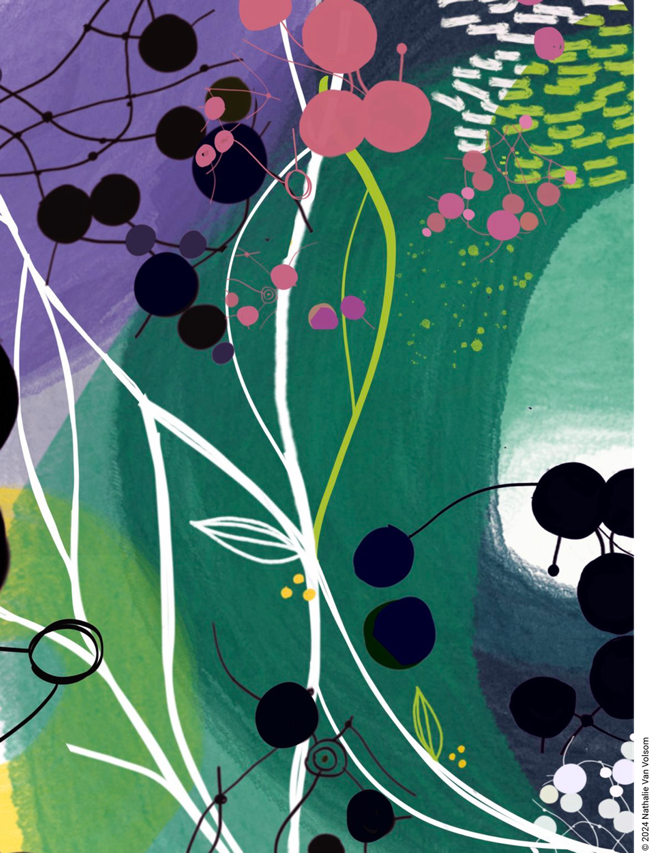Drawing New Relationalities with Migrants and Immobile Exiles
DOI:
https://doi.org/10.47061/jasc.v4i1.7065Keywords:
drawing, art-based research, transformative education, systems change, relationality, climate change, migrationAbstract
In this paper, we explore how drawing can be used as transformative educational practice in the context of climate change shifting our relationships with the living world. As a starting point, we share our understanding that we are entering times where the relationships with living systems around us are no longer stable and predictable (Morizot, 2023). Some people experience this instability through forced exile and migrant journeys. Others do not travel but become immobile exiles (Morizot, 2023). This context has invited us to start a co-inquiry into relationality through the practice of drawing. We ground this exploration in four examples from our respective work in the fields of systems change, education of the arts and participatory arts-based research. Each of the examples illustrates how small groups of people - both children and adults - can develop awareness of changing relationalities between humans, other living beings and vibrant matter (Bennett, 2010). In the workshops we have facilitated, the images themselves come alive as quasi-organisms (Simondon, 2022). With a phenomenological gaze, we reflect on their capacity to support the becoming visible of micropolitical agencies with the potential to reconfigure systems towards decisive mutations of plurality (Glissant, 1996).
References
Al-Saji, A. (2017). Feminist phenomenology. In S. Khader, A. Garry, & A. Stone (Eds.), The Routledge companion to feminist philosophy (pp. 143–154). Routledge. https://doi.org/10.4324/9781315758152-13
Alvarez De Toledo, S. (2001). Pédagogie poétique de Fernand Deligny. Communications, 71(1). 245–275. https://doi.org/10.3406/comm.2001.2087
Baillat, A. (2018). Les migrations climatiques à l’épreuve du «schisme de réalité» [Climate migrations put to the test by the “schism of reality] [Brochure]. Institut de relations internationales et stratégiques. https://www.iris-france.org/wp-content/uploads/2018/07/ProgClimat-Migrations-climatiques-Juillet-2018.pdf
Barad, K. (2007). Meeting the universe halfway: Quantum physics and the entanglement of matter and meaning. Duke University Press.
Baudoin, E. & Troubs (2017). Humains : La Roya est un fleuve. [Humans: The Roya is a river]. L’Association.
Bennett, J. (2010). Vibrant matter: A political ecology of things. Duke University Press. https://doi.org/10.1215/9780822391623
Berger, J. (2013). Drawing is discovery. New Statesman, 53. (Original work published 1953).
Birney, A. (2015). How might people and organisations, who seek a sustainable future, cultivate systemic change? [unpublished Doctoral dissertation, Lancaster University].
Boulton, J., Allen, P., & Bowman, C. (2015). Embracing complexity. Oxford University Press. https://doi.org/10.1093/acprof:oso/9780199565252.001.0001
Courier, C. (2022). Ombres d’exil: du dessin-scène par nuages de points à l’émergence de transagirs micropolitiques [Shadows of exile: from drawing-scene by clouds of dots to the emergence of micropolitical transagencies]. [Doctoral dissertation, Université du Québec à Montréal]. https://archipel.uqam.ca/15189/
Courier, C. & Winn, L. (2023, April 19). Engendering symbiotic imaginaries as intra-action between multiple life- and material-matter forms through artistic-scientific drawing practice [Online conference presentation]. Drawing in Relation online conference. https://blog.lboro.ac.uk/tracey/drn2023-drawing-in-relation-affect-agency-recording/
Damasio, A. (2020). Afterword. In B. Morizot, Manières d’être vivant (1st ed., pp. 308–325). Actes Sud.
De Zegher, C. (Curator). (2003). The stage of drawing: Gesture and act [Exhibition catalogue]. Tate Publishing and Drawing Center.
Deligny, F. & Manenti, J. (Director). (1971). The slightest gesture [Film].
Deligny, F. (2015). The Arachnean and other texts. (D. S. Burk & C. Porter, Trans.). Univocal.
Geels, F. (2011). The multi-level perspective on sustainability transitions: Responses to seven criticisms. Environmental Innovation and Societal Transitions, 1(1), 24–40. https://doi.org/10.1016/j.eist.2011.02.002
Glaveanu, V. P. (2015). Creativity as a sociocultural act. The Journal of Creative Behavior, 49(3), 165–180. https://doi.org/10.1002/jocb.94
Glissant, E. (1996). Introduction à une poétique du divers [Introduction to a poetics of diversity]. Gallimard.
Goodchild, M. (2021). Relational systems thinking: The Dibaajimowin (story) of re-theorizing “systems thinking” and “complexity science”. Journal of Awareness-Based Systems Change, 2(1), 53–76. https://doi.org/10.47061/jabsc.v2i1.2027
Guattari, F. (2014). The three ecologies. (I. Pindar & P. Sutton, Trans.). Bloomsbury Academic. https://doi.org/10.5040/9781350354531
Guattari, F. & Rolnik, S. (1996). Micropolitics: Cartography of desire. Petrópolis: Vozes.
Haney, W., Russell, M., & Bebell, D. (2004). Drawing on education: Using drawings to document schooling and support change. Harvard Educational Review, 74(3), 241–271. https://doi.org/10.17763/haer.74.3.w0817u84w7452011
hooks, b. (1994) Teaching to transgress: Education as the practice of freedom. Routledge.
Ingold, T. (2011). Redrawing anthropology: Materials, movements, lines. Farnham. https://doi.org/10.4324/9781315604183
Knutson, K., Okada, T. & Crowley, K. (Eds.). (2021). Multidisciplinary approaches to art learning and creativity: Fostering artistic exploration in formal and informal settings. Routledge.
Komatsu, K., & Namai, R. (2022). Art = research: Inquiry in creative practice. In K. Komatsu, K. Takagi, H. Ishiguro & T. Okada (Eds.), Arts-based methods in education research in Japan (pp. 1–23). Brill. https://doi.org/10.1163/9789004514140_001
LAB619 (2021). Migrations : Dessiner l’exil. Editions Alifbata.
Mang, P., Haggard, B., & Regenesis. (2016). Regenerative development: A framework for evolving sustainability. John Wiley & Sons. https://doi.org/10.1002/9781119149699
Massumi, B. (2017). Towards a politics of dividualism. Multitudes, 68(3), 77–87. https://www.cairn-int.info/journal--2017-3-page-77.htm
Milligan, K., Zerda, J., & Kania, J. (2022). The relational work of systems change: Collective impact efforts must prioritize working together in more relational ways to find systemic solutions to social problems. Stanford Social Innovation Review. https://doi.org/10.48558/mdbh-da38
Morizot, B. (2023). L’Inexploré. Wildproject.
Simondon, G. (2022). Imagination and invention. Minnesota University Press.
Stengers, I. (2009). Au temps des catastrophes [Disaster time]. Éditions de la Découverte.
Torbert, B. (2013). Listening into the dark: An essay testing the validity and efficacy of collaborative developmental action inquiry for describing and encouraging the transformation of self, society, and scientific inquiry. Integral Review, 9(2), 264–299.
Tuck, E. & Wayne Yang, K. (2012). Decolonization is not a metaphor. Decolonization: Indigeneity, Education & Society, 1(1), 1–40. https://doi.org/10.25058/20112742.n38.04
Yunkaporta, T. (2019). Sand talk: How Indigenous thinking can save the world. HarperOne.
Zwer, N. & Rekacewicz, P. (2021). Cartographie radicale. Explorations. Editions La Découverte.
Downloads
Published
How to Cite
Issue
Section
License
Copyright (c) 2024 Camille Courier, Laura Winn

This work is licensed under a Creative Commons Attribution 4.0 International License.


